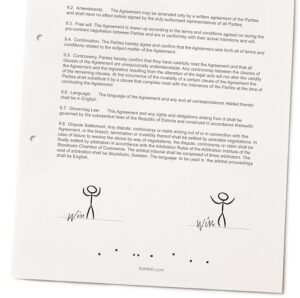News
Important changes in the regulation of employment relations in Lithuania (comparison with regulation in Latvia and Estonia).

The new Labour Code of the Republic of Lithuania will enter into force on 1 July 2017. More liberal regulation of employment relations is expected to encourage foreign investment in Lithuania and facilitate the creation of new jobs.
One of the fundamental new developments is a simplified termination of an employment contract. For example, the notice period in the case of the pending termination of an employment contract on the initiative of an employer without the fault of an employee (e.g. in case of structural transformation of a company) shall be reduced. Once the new Labour Code comes into force, the standard period of notice that an employer must give to an employee on the termination of an employment contract without the fault of an employee shall be 1 month. The current regulatory framework provides that the standard period of notice that an employer must give to an employee is 2 months.
Should an employment contract be terminated on the initiative of an employer without the fault of an employee (e.g. in case of structural transformation of a company), the employee shall be entitled to a severance pay of his 2 average monthly salaries (the standard case). Currently the severance pay that the employer has to pay when dismissing an employee is 1-6 average monthly salaries of the employee, depending on the duration of his employment with the employer.
Under the Latvian law in case of reduction in the number of employees on basis of the performance of urgent economic, organisational, technological or similar measures in the undertaking, the notice period is 1 month and employee is entitled to compensation in amount up to 4 average salaries depending on the duration of employment relations.
In Estonia the notice period in the case of cancellation by employer depends on the duration of employment relationship and varies from 15 to 90 calendar days, the severance pay in case of structural transformation of a company is 1 salary.
Another new development of the Lithuanian Labour Code is a possibility to dismiss an employee without having to provide a reason for such termination and by giving a mere 3 business days’ notice of termination. However, in this case the employee shall be entitled to the severance pay of his 6 average monthly salaries. The current legislation does not provide for such grounds for the termination of an employment contract.
Unlike it is provided in the new Lithuanian Labour Code, Latvian and Estonian laws do not provide possibility to dismiss an employee without having to provide a reason for such termination.
The employee liability for damage to the employer shall be capped at 3 employee average monthly salaries; if pecuniary damage is caused due to a gross negligence of the employee, liability shall be capped at 6 average monthly salaries of the employee. The new regulation no longer provides an option to conclude a contract of full liability of the employee under which the amount of damage to be compensated by the employee is currently unlimited. As of 1 July 2017, employees will have to compensate all damage only in exceptional cases, such as where damage is caused intentionally; damage is caused by a crime; damage is caused by an employee under the influence of alcohol, drugs, toxic or psychotropic substances; damage is caused in violation to the undertaking to keep information confidential or in breach of a non-competition agreement; non-pecuniary damage is caused to an employer; or where full compensation of damage is provided in a collective agreement.
In Latvia the employee shall be liable only for the reduction of the present property of the employer, but in case of damages caused with malicious intent of the employee or due to his or her illegal, culpable action not related to performance of the contracted work, the employee shall be liable for all losses to the employer. The Labour Law does not provide limits to such liability; however the aspects of liability shall be viewed in conjunction with the respective Civil law regulations.
In Estonia the Employment Contracts Act allows concluding an agreement on proprietary liability by which an employee assumes, regardless of guilt, liability for preservation of the property given to him or her for the performance of duties. Such agreement is valid only if it has been concluded in writing, it has been delimited reasonably and recognisably for the employee in terms of space, time and objects; the property entrusted to the employee can be accessed only by the employee or a definite circle of employees; the upper financial limit of liability has been agreed on; the employer pays the employee reasonable compensation, considering the upper limit of liability.
Prior to the adoption of the new Labour Law there was no specific regulation in Lithuania regarding non-competition agreements, even though employers and employees used to enter into such agreements as they were not prohibited by legal acts. The new Labour Code provides that for the duration of the period of non-competition with the employer the employee shall be entitled to compensation amounting to at least 40% of the average salary of the employee at the time of the termination of the employment contract. The employee shall not be entitled to compensation for non-competition during his employment with the employer. The new Labour Code also establishes the specific period of non-competition, viz. the maximum duration shall be two years after the termination of the employment contract.
According to the Latvian Labour Law the term for restriction on competition as well as in Lithuania cannot exceed 2 years. Non-competition agreements have to provide for a duty of the employer to pay the employee adequate monthly compensation.
In Estonia the non-competition agreement is applicable after the expiry of an employment contract up to one year starting from the expiry of the employment contract. Employer is subject to pay the employee a reasonable monthly compensation after the expiry of the employment contract.
To promote cooperation between employees and employers and to ensure a better protection of the employees’ rights, the new Lithuanian Labour Code provides that each company with the average number of 20 or more employees will have an obligation to initiate the establishment of a labour council. In cases provided by the new Labour Code the employer will have to consult with the labour council and provide it with information specified in the Labour Code prior to adopting relevant decisions.
According to the Latvian law, employee representatives may be either a trade union or authorised employee representatives, who have been elected in accordance with the law. Such employee representatives may be elected if an undertaking employs five or more employees; however there is no obligation provided for an employer to initiate such elections. Article 11 of the Labour Law lays down the rights and duties of employee representatives.
In Estonia the obligation to initiate the establishment of a labour council or trade union does not exist.
Under the new Lithuanian Labour Code the minimum salary shall only be paid for unskilled labour. Unskilled labour shall be labour that does not require any specific qualification skills or professional capacities. There are no limitations to whom minimum salary can be paid in Latvia and Estonia.
A table of comparison between Lithuanian, Latvian and Estonian labour regulations related to the changes discussed above:
| LT | LV | EE | |
| Notice period for termination of employment contract in case of structural transformation of a company | 1 month (the standard case) | 1 month | 30 calendar days |
| Severance pay in case of structural transformation of a company | 2 salaries (the standard case) | 1-4 salaries (depends on the duration of employment relations) | 1 salary |
| Dismissal of employee without providing any grounds | Notice period – 3 business days Severance pay – 6 salaries | Cannot be dismissed without providing grounds (unless its probation period ) | Cannot be dismissed without providing grounds |
| Limits of employee liability for damages to the employer | 3 salaries; in case of gross negligence – 6 salaries (there are exceptions) | Does not provide liability limits | Is agreed upon |
| Non-competition compensation | At least 40% of the average salary | Adequate compensation | Adequate compensation |
| Non-competition max time limit | 2 years | 2 years | 1 year |
| Obligation for employer to initiate labour council | If number of employees > 20 | There is no such obligation | There is no such obligation |
| Minimum salary | Only for unskilled labour | Does not provide limitations to whom minimum salary can be paid | Does not provide limitations to whom minimum salary can be paid |
News prepared by:
LEADELL Pilv/Estonia/Jaak Siim/jaak.siim@leadell.com;
LEADELL Balčiūnas & Grajauskas/Lithuania/Justinas Leita/justinas.leita@leadell.com;
LEADELL Fogels, Vītols & Paipa/Latvia/Artūrs Rubins/arturs.rubins@leadell.com.
Categories
Subscribe to Leadell's Newsletter






